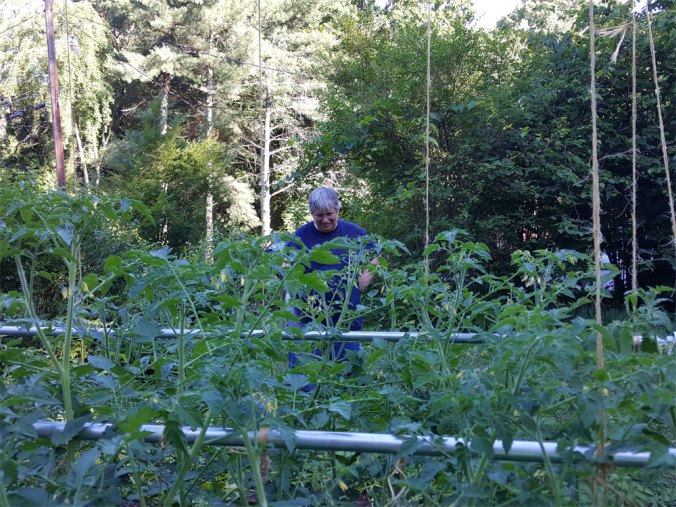When I built the trellis for the tomatoes a few people wondered why on earth I made it so tall. The middle bar is about 4 feet above the ground and the top bar is at 7 feet. I told them that this is as high as I can comfortably reach. The looks I got said it all. They thought I was crazy. No one but me thought they would benefit from a trellis this tall.

“Sweetie” open pollinated cherry tomatoes. That’s me admiring the potatoes. June 7, 2016
Remember we don’t use commercial fertilizers, nor do we spray. Co-workers think that’s about the silliest thing they ever heard. But is it? Look at the forests, the meadows, the diversity of life in natural areas left untouched by man. They team with life and not a bag of 10-10-10 insight. Just the cycle of life. When something dies (be it plant or animal) the things it took from the earth are given back to the earth. In death they provide nourishment for the living.
How many of the products lining store shelves are truly needed? How many do we think we need as a result of marketing and peer pressure?
Have a little faith. Compost your food scraps, the weeds you pull, and the autumn leaves. Feed the soil. And don’t expect miracles the first year. Soil that has been severely depleted and abused may take several years to recover. But recover it will and as you look over the seeds you have sown you will begin to wonder why there are so many items on the shelves of the garden center when all you need is a seed, a little rain, and a little faith.
“The soil is the great connector of lives, the source and destination of all. It is the healer and restorer and resurrector, by which disease passes into health, age into youth, death into life. Without proper care for it we can have no community, because without proper care for it we can have no life.”
― Wendell Berry
Very true. True also, I think of pesticides. I visited Perelandra Nature Research Institute many years ago, when they still had open days, and was struck by a garden bed they called ‘bug boulevard’ full of plants solely for the benefit of insects. I don’t spray at all and I’ve noticed that often volunteer plants will divert bugs from the ‘regular’ plants. I’m also beginning to think that being nibbled a bit by bugs is necessary for young plants to maximise production of antioxidants – a bit like the human immune system requires exposure to bacteria and viruses in order to function properly. When plants sustain major bug damage it is a sign of imbalance, a warning that something is out of kilter, most probably in the soil.
LikeLike
Thanks so much for your comments. This is something we all need to learn. My friends that spray seem to get rid of one problem only to create another. My experience has been that plants are much more resilient than we give them credit for.
LikeLiked by 1 person
Amen! Thank you for this beautiful reminder of the power and intelligence of Nature…
May I reblog?
LikeLike
Yes, I’d be honored.
LikeLiked by 1 person
Thank you!
LikeLike
Reblogged this on Partner the Water and commented:
Cheers to fellow garden-friendly blogger Wolfego for this inspiring piece on the resilience and intelligence of Nature…
LikeLike
Ouch, ouch – apologies for misspelling your our name! Please delete and let me correct…
LikeLike
I think I’ll leave it. LOL. It took me awhile to see it. You had me laughing so hard. When it seems like a segment of the human race has just gone crazy (the shooting in Orlando) it’s nice to be able to distance yourself if only for a little while. Thanks for a break from the craziness and the smiles.
I started using wolfegeo because: 1. My last name is Wolfe; 2: geo refers to the earth. I have a degree in applied geography. Geographers study the earth; and 3. it was easy for me to remember.
Again, thanks for the smiles.
LikeLike
Thank you for the smile in return! I know, in view of all that’s going on in the world, a dropped “e” is pretty small potatoes…thanks for taking it so!
LikeLiked by 1 person
Wonderful.
LikeLike
Wonderful garden! My first tomatoes grew higher than me. I’m 5’2. I have never used any commercial fertilizer, pesticide or herbicide. I use permaculture/nature-based/organic methods which consist on composting everything (as you do), I also have a composting bin for worms, I make EM and composting tea and use some powerful herbs to make concoctions that help plants to grow healthy. The secret of a good and healthy yield is to ensure healthy soil and healthy plants. You will always have some pests and unwanted herbs (aka “weeds”) but they show up when there is a lack of balance or when we are trying to grow something that doesn’t fit the ecosystem we have…annuals tend to be more problematic because they don’t live long enough to develop strong roots and relationships with fungi and other organisms, so I mix edible perennials both at home and in my community garden. Annuals are also limited in biodiversity, so better if you can find heirlooms and get different varieties growing on at the same time: it is very unlikely that you will have all of them suffering from the same, and that will give you a hint of what grows best under what circumstances such as drought, heat or cold, etc…
LikeLiked by 1 person
I love your reference to weeds as unwanted herbs. Growing up I looked upon weeds as a plants simply growing in a location in which they were not desired. Thanks for sharing your insight and experience Silvia.
LikeLiked by 2 people